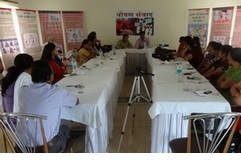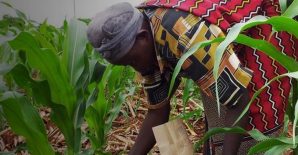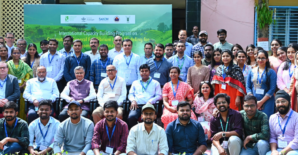Khandwa District, Madhya Pradesh, 24 September 2013
On 24th of September, 2013, Vikas Samvad, a POSHAN knowledge mobilization partner, held a network-building meeting of the Child Development Project Officers (CDPOs) and supervisors of Khandwa District Madhya Pradesh in order to gain a better understanding of any issues they face in the implementation of the Integrated Child Development Service (ICDS) programme and to discuss peer networks and knowledge sharing. Vikas Samvad organized this meeting with their partner, grassroots organisation Spandan Samaj Seva Samiti. This network-building meeting was organized as a part of the knowledge mobilization activities of the POSHAN project. 21 participants attended (CDPOs and supervisors) from the Department of Women and Child Development (DWCD), including the District Project Officer (DPO).
The meeting allowed participants to voice concerns and discuss potential solutions related to the implementation of the ICDS programme.
The participants began by highlighting the lack of convergence of programs on the ground. Participants were of the opinion that the various local departments do not communicate with one another, leading to uncoordinated responses to local health and nutrition issues in Khandwa District.
An operational challenge introduced in the discussion was related to the referral of sick children. The group discussion revealed that there is no provision for the transportation of family members, and on occasion, staff members cover these costs from their personal resources.
The group also highlighted the challenges faced by families from tribal areas as they travel to seek treatment. Typically, an Anganwadi Worker (AWW) is required to accompany severely malnourished children to the treatment facility with their respective families. However, in many cases AWWs are not fully aware of the procedures of district hospitals. This situation is even more challenging for parents from tribal communities, who are even less familiar with these types of settings. Participants reported that if visitors are mistreated at the facility, they return and recount their experiences to others in the community. In these cases, the community slowly loses faith in the established healthcare system, and is no longer receptive to the instructions of AWWs. These issues can be addressed with proper training of staff at district hospitals and Nutrition Rehabilitation Centres (NRCs).
Another concern highlighted by supervisors during the meeting was the lack of childcare services for mothers who need to stay with their severely malnourished child at the NRC. Mothers are not comfortable leaving their other children unattended at home, particularly if they are still being nursed. In such cases, despite the wide range of benefits, including treatment for malnourished children and monetary incentives, some mothers leave the NRC to attend to their other children.
Other issues, including the dispensing of expired medicines from the Arogya Kendra at AWCs, were raised during the discussion. It was said that the Auxiliary Nurse Midwife (ANM) provides general medicines to the Arogya Kendra at Anganwadi Centres (AWCs) from time to time, and those medicines are later dispensed locally by AWWs. It was reported that the medicines often expire on the shelves, and are not removed on subsequent visits by the ANM. Participants discussed the lack of clarity over whose responsibility it should be to regularly remove expired medicines and ensure that medicines nearing expiry are dispensed appropriately.
The DPO also described some of the challenges related to budgetary provisions for AWCs. A provision of 500 INR is allotted for a Salter scale for each AWC. However, the actual price of a salter scale is over 1200 INR. There are no untied funds available to the AWC to cover the remaining balance. Furthermore, the untied funds from the gram panchayat are not utilized for any such expenses at the AWC. Within the ICDS, an annual contingency fund of 300 INR is available to each AWC. This amount is usually spent on the purchasing of water containers, soap, brooms, etc.
The meeting highlighted a number of topical issues related to maternal and child nutrition in Khandwa District. The group emphasized the importance of considering health and nutrition together, while recognizing that issues such as food security, access to clean water, sanitation, livelihoods and migration are equally important and closely related to addressing malnutrition. The participants recognized that it is essential that the different departments work in tandem on the ground to address the issue of malnutrition. In order to facilitate dialogue, the participants agreed that the development of a forum to openly discuss local issues related to convergence, including examples of successful coordination, would be beneficial.
Following this meeting, Vikas Samvad plans to support further discussions with the CDPOs and supervisors of Khandwa District.




